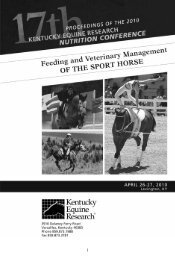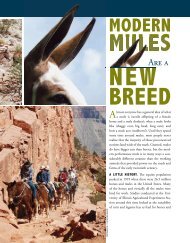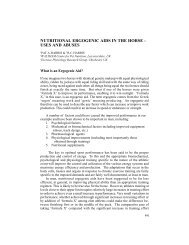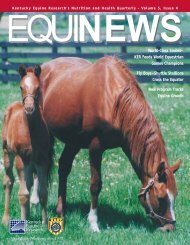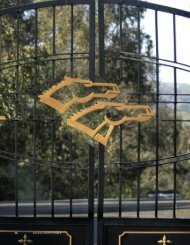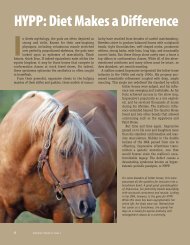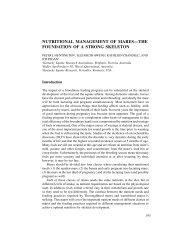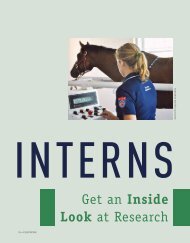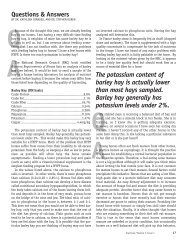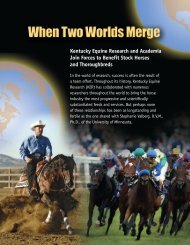New Staff Members Explore Relationship Between Nutrition and ...
New Staff Members Explore Relationship Between Nutrition and ...
New Staff Members Explore Relationship Between Nutrition and ...
- No tags were found...
Create successful ePaper yourself
Turn your PDF publications into a flip-book with our unique Google optimized e-Paper software.
Thoroughbred sprinter’s physiological response to exercise comparedto an Arabian horse completing an endurance race?Not surprisingly, the critical connection between diet <strong>and</strong> exerciseemerged more clearly with the results of every study. KERpresident Dr. Joe Pagan commented, “We know that nutritionstrongly influences every aspect of a horse’s life. Over the years,we’ve learned a lot about how to modify equine diets to relieveexercise-induced muscle conditions. A new focus of the company isto find ways of preventing, rather than treating, nutrition-relatedproblems so that horses can perform to their maximum abilities.”Melissa Fryer is manager of KERx Special Needs <strong>Nutrition</strong>, a divisiondesigned to extend the range of KER’s services by combiningthe individual strengths of veterinarians <strong>and</strong> nutritionists in order tooptimize equine wellness. A Versailles, Kentucky native, Melissa isnot new to KER, having worked as a summer intern during her highschool years. Her present position, however, has a much broaderscope, encompassing product development <strong>and</strong> marketing as wellas the dissemination of nutritional information to veterinarians <strong>and</strong>horse owners.“<strong>Nutrition</strong> is increasingly on the minds of veterinarians,” sheexplained. “They are finding that nutrition is related to many medicalconditions such as tying-up, hindgut acidosis, <strong>and</strong> insulinMoving OnAs new personnel moved in, Tiffany Dobbs, a research internfrom Queensl<strong>and</strong>, Australia moved on. The year she spent atKER was packed with activities <strong>and</strong> adventures as she made useof the many resources in nearby Lexington, heart of theThoroughbred world. “The industry here is just remarkable,” shesaid. “KER offers many opportunities, but so does the entireLexington area. There were so many resources available here toexp<strong>and</strong> my experience!“ Exploring the region, Tiffany madeconnections with a number of professionals who welcomed herskills <strong>and</strong> enthusiasm. She spent some time assisting with studiesof genetics, reproduction, <strong>and</strong> nutrition at the Gluck EquineResearch Center at the University of Kentucky. Training, riding,<strong>and</strong> showing third-level dressage horses at a nearby stable tookup more hours, <strong>and</strong> whatever free time was left over was spenttraveling to nearby points of interest.Armed with degrees in applied animal science with specialstudy in insulin resistance from the University of Queensl<strong>and</strong>,Tiffany had first applied to work at KER’s Australian office, butwhen she found out about the research intern program, shejumped at the chance to spend a year in the U.S. At the end ofher stay, she commented on her experience: “I learned you cannever stress nutrition enough. I really enjoyed working with JoePagan <strong>and</strong> Karen Hooks on insulin resistance research. AndStephanie Valberg was very knowledgeable <strong>and</strong> wonderful towork with.”What’s on tap now for Tiffany? After some travel, she’llreturn to the University of Queensl<strong>and</strong> to work toward a doctorate.She’s especially interested in insulin resistance <strong>and</strong> OCD,<strong>and</strong> expects to spend about three years earning her degreebefore looking for a position in the field of equine nutrition.Catherine BishopAustralian nativeTiffany Dobbsrecently finished a yearas a KER researchintern. Her favorite barnbuddy was Pepe, afour-year-oldThoroughbred gelding.16 Equinews/ Volume 11, Issue 1
esistance that are seen on a daily basis. KERx is a resource whenowners have specific questions about feeding their horses. If veterinariansneed more information on nutrition, they can seek us outfor some input, or direct their clients to us. Our goal is to provideeducation so clients can take the best care of their horses.”KERx offers a range of products <strong>and</strong> services to veterinarians<strong>and</strong> horse owners, <strong>and</strong> Melissa has been instrumental in gettingthe program started. Helping to design the Web site(www.kerx.com), marketing the new division through trade shows<strong>and</strong> meetings, <strong>and</strong> defining objectives for distributors are all withinthe scope of her position. Melissa’s education (degree inmarketing) <strong>and</strong> work experience (management, financial planning,<strong>and</strong> sales) have given her solid business skills, while herstrong equine background (riding <strong>and</strong> showing hunters, memberof hunt-seat <strong>and</strong> Western collegiate equestrian teams, huntershow judge) is a benefit when she talks to anyone in the horsebusiness. However, no one person can launch a concept like KERxSpecial Needs <strong>Nutrition</strong>, <strong>and</strong> Melissa works closely with other staffmembers to achieve the new division’s goals.Dr. Karen Hooks, a veterinarian from Arkansas, joined KER in thefall of 2007. Visiting her gr<strong>and</strong>father’s ponies as a young child,Karen developed an interest in learning how to provide care <strong>and</strong>healing to horses <strong>and</strong> other animals. After the ponies came aQuarter Horse, then a foxtrotter, <strong>and</strong> then dressage <strong>and</strong> jumping ona leased Thoroughbred. Following veterinary school, she bought aThoroughbred/Clydesdale cross gelding, <strong>and</strong> most recently becamethe owner of a two-year-old Hanoverian. In addition to this h<strong>and</strong>sonexperience with many different breeds <strong>and</strong> types of horses,Karen has studied veterinary chiropractic <strong>and</strong> acupuncture therapies,<strong>and</strong> lists years of experience in clinical practice, farm calls, <strong>and</strong>emergency medicine <strong>and</strong> surgery.Looking for a change, she was drawn to Kentucky EquineResearch. “I knew KER conducted excellent research <strong>and</strong> offeredgood products for the benefit of the animals,” she explained. “Also, Ilike the fact that the company looks toward preventing health problemsrather than simply fixing them.”In addition to providing routine veterinary care for the more than30 horses in the KER herd, Karen’s work will focus on research <strong>and</strong>product development. One of her first assignments involved theKERx Wellness Program, in which a team evaluates horses in a particularstable, identifying specific dietary needs <strong>and</strong> health risks foreach animal based on riding discipline, exercise schedule, <strong>and</strong> otherfactors. “Every horse’s profile will be unique,” she said. “If you lookat a dressage horse, a Gr<strong>and</strong> Prix jumper, <strong>and</strong> a young racehorse,their requirements for various nutrients will be slightly different. I’lllook at dietary parameters, <strong>and</strong> also determine each horse’s risk forJeff Rogersparticular injuries <strong>and</strong> metabolic problems based on the dem<strong>and</strong>sof training <strong>and</strong> performance.” With this information, the KERx staffcan design a Wellness Supplement containing all the ingredientsneeded to support health <strong>and</strong> exercise for each individual.Assisting with the Wellness Program is Nicola Crowley, whorecently finished a year working directly with the KER horses beforeaccepting a position as a research fellow. Nicola, who came to theU.S. from Liverpool, Engl<strong>and</strong>, is currently working on the nutritionalaudits that precede Wellness Supplement formulation. She’s alsoresearching behavioral issues with performance horses, <strong>and</strong> willhelp to design studies evaluating the effects of diet on behavior. Intime, this effort may lead to products that can allow horses to workmore calmly, eliminating stress <strong>and</strong> enhancing overall well-being.An eventing enthusiast who rides <strong>and</strong> competes regularly, Nicolaappreciates the importance of groundwork <strong>and</strong> preparation in bothriding <strong>and</strong> research. “I went to a meeting the other day to discussproduct development,” she said. “It was exciting to see a productbeing built around the results of the research data I helped collectlast year when I worked with the horses. When you’re doing barnchores every day, maybe cleaning stalls or bathing horses whenthey come off the treadmill, it’s hard to keep in mind that you’reactually participating in a study that could influence the design ofproducts <strong>and</strong> supplements in the future.”If these efforts can someday eliminate problems like insulinresistance or severe muscle cramping in equine athletes, owners willsee their horses staying healthier <strong>and</strong> performing better.Equinews/Volume 11, Issue 1 17
Reprint Courtesy ofKentucky Equine Research, Inc.3910 Delaney Ferry RoadVersailles, KY 40383Phone: 859-873-1988Fax: 859-873-3781Order Department: 888-873-1988www.ker.cominfo@ker.com



